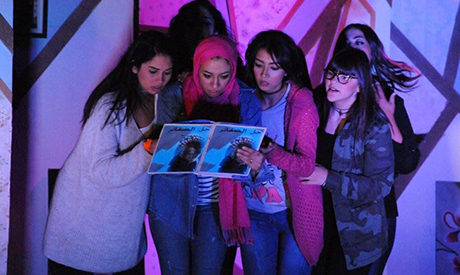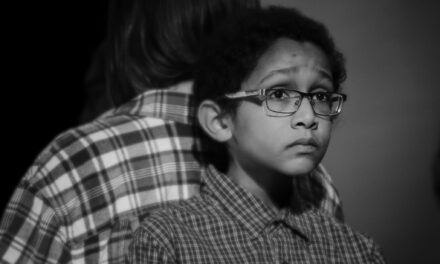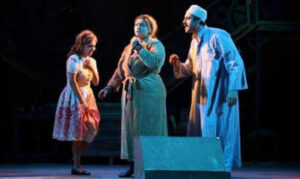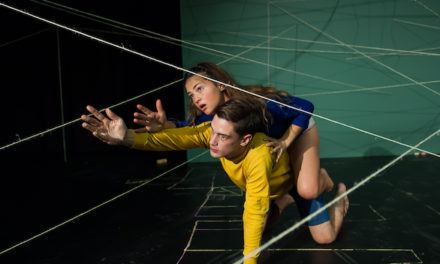The play Untangled (Hal El-Dafayer) was staged at Cairo’s Hosapeer Theatre last week, where a full house roared continuously with laughter at a comedy tackling social issues among youth.
The play is directed by Mohamed Fouad Abdeen, who co-wrote it with Sally Zohney, and performed by Wojood theatre troupe. The 8 and 9 April stagings came five months after the play’s premiere at Hosapeer in November 2016.
Fast-paced, quick-witted, relatable and fun, but marked by a serious undercurrent, Untangled reflects on the issues and struggles of being young, recounting them imaginatively and humorously. The humour relies on many references to pop culture, wordplay, as well as an element of physical comedy or clowning. The comic sketches unfold like stories within a story, at the center of which are a young girl and her new friend, a book that comes to life.
In a sense, the young girl’s journey embodies the audience’s experience, as she opens her eyes to social issues that the book reveals story by story. Some of the issues presented include a woman facing the stigma that surrounds infertility, another being forced to drop her ambition to become a professional athlete under pressure from her family to get married and the frustrations of another woman under the authoritarian guardianship of her brothers.
Other stories reflect on the death of romancing by Kasr El-Nil bridge, once the go-to spot for Cairene lovers, and the deterioration of street and social ethics.
Gender-focused
The audience at Hosapeer was composed mostly of youth, in the age range that would relate to the issues on stage. Zohney and the play’s producer Karim El-Shenawy began the project by looking at other similar plays, finding elements they liked and others they wanted to see more of, and elaborate upon.
“We wanted to see a play [on these issues] that was a comedy, not too direct, and also [targetted towards a] very young audience, and with a strong gender focus. It was also very important for us to steer away from the circle of audience we know that are already aware and familiar with all these subjects,” Zohney told Ahram Online.
Zohney’s professional background is in gender-based violence, as she worked with UN Women for six years, and is currently working at the German development agency GIZ. Her introduction to theatre and storytelling came through her participation in Tahrir Monologues and Bussy Project.
“Through my work in development, I also worked on projects that used theatre as a social tool. One project was in El-Minya using theatre to talk about domestic violence. So I learned more about how theatre can be used not only as entertainment but for [spreading] awareness,” she says.
As such, one of the elements they wanted to see more of on stage was women’s issues, which they felt were marginalised. While most of the subjects in Untangled involve women, there is also one that centres on men, reflecting on modern gym culture, peer pressure, different masculine motives for working out and thoughts on how to attract women.
“The play is gender sensitive, not women-oriented or feminist. So it’s about masculinity as well, and the mainstream and social pressures,” Zohney says, adding that they plan to add more sketches that are male-centred.
An evolving script
In fact, the play is in constant development and the script freshly updated for last week’s performances, which was obvious in references to some very recent popular events.
“For the latest staging, we had changed some parts of the script and changed the ending from how it was in November. Every time we adapt, even if the sketch is the same. It doesn’t make sense that things happen around us and we don’t include them, so we’re not isolated,” she says.
Some of the segments were previously longer, including one that centred on arranged marriages, and another on a young woman who wanted to become the leader of a mostly-male acting troupe in her university. One of the newly added segments focused on the life of a divorced woman.
The initial scriptwriting was an equally dynamic process.
“Mohamed Fouad, the director, formulated the script to stage. I would suggest a subject, then we’d start researching and gathering facts. The characters were not written, we gave the actors the framework and allowed them to add from their own experiences,” Zohney says.
The quick dialogue is complemented by the actors’ presence on stage, each presenting a distinct character with their own peculiarities. The actors’ skills were shadowed at times, however, by top-of-the-lung speech that was common with too many characters, and for too long. Though the high energy was often for comic effect, it was as if the actors were all trying too hard to be seen and heard, where a variation in the tones of delivery would have made the characters even more compelling and enjoyable and given the script more space to hold its own.
Heavy made humorous
The script, in colloquial Arabic, is one of the aspects that carries the play and makes it engaging as well as more accessible to the audience. Another is the creative angle with which the stories are presented: not a one like the other. One of the skits is a television show analysing a video of a woman being physically harassed or raped – this is left for the viewers to decide – while bystanders fail to help her in any way. Zohney explains that because of the heavy subject this was a very difficult scene that took a lot of work and consideration over how to present it.
“We’re not spotlighting the rape itself; rather, we wanted to focus on the fact that people are judging it from the comfort of their homes. We tried to shift the attention to looking at how we as a people react. We also didn’t want to make it too morbid,” she says.
The scene was still made humorous, leaving one feeling uncomfortable about laughing given the tense subject matter. “I noticed this reaction comes mostly from women, being hesitant and almost ashamed to laugh about it. But I think to men it becomes a soft introduction to the topic from another angle,” Zohney adds.
On the play’s future, Zohney says this year they are working to have it staged for a duration of two weeks or a month. “As much as we liked Hosapeer Theatre, it needed a big production budget to make it as good as we wanted it. Last year, we had funding from UNDP, which helped us financially, so this year we are on our own. We want to have the play be very flexible, so we can stage longer or shorter versions of it depending on the possibilities we have,” Zohney says.
In terms of marketing and outreach, up to this point the team have been dependent on social media. “Now we are trying to expand the network of people who hear about it. Then maybe afterwards we can tour the cities, and integrate issues specific to other places in Egypt outside Cairo,” Zohney concludes.
This article was originally posted on http://english.ahram.org.eg Reposted with permission. To read original article, click here.
This post was written by the author in their personal capacity.The opinions expressed in this article are the author’s own and do not reflect the view of The Theatre Times, their staff or collaborators.
This post was written by Soha Elsirgany.
The views expressed here belong to the author and do not necessarily reflect our views and opinions.


















